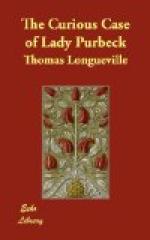There had been some sort of reconciliation between Coke and Lady Elizabeth in July, 1621, says Woolrych in his life of Coke, “a reconciliation effected through the mediation of the King.” It was not, however, cordial; for “we have good reason to suppose that they lived apart to the day of Coke’s death,” says Campbell. At any rate they were now on speaking terms, though that was about all; for, as we have just seen, Coke refused to meddle in a matter upon which he was eminently qualified to give an opinion, and he got rid of his wife after an interview of seven minutes and a half, instead of giving her the leisurely and lengthy advice and instructions which were the least that she might have expected from him. Sympathy, of course, she could not have hoped for.
The proceedings against the two delinquents would appear to have been in abeyance during the rest of the year; but in January, 1625, Sir John Coke—the Secretary of State, not one of the Cokes of Sir Edward’s family—wrote[63] to Buckingham, saying that the King, although so ill as scarcely to be able to sign his name, had put it to the warrant sent by the Lord Chief Justice for authority to examine into Lady Purbeck’s business. This warrant, however, James either issued with certain qualifications, or else privately advised Buckingham only to act upon with prudence, as may be inferred from the following letter,[64] written on February the 11th, by Buckingham to the Lord Chief Justice:—
“I have moved the P. for a warrant from his ma^tie for the commitment of Sir Ro. Howard and my sister Purbeck, but his ma^tie hath out of his gracious and provident care of me dissuaded me in this lest upon it coming to a publique hearing it might be thought that I had gained power more by the way of favour than by the wayes of justice.... I desire you to acquaint this bearer Mr. Innocent Lanier all the particulars of this matter for I know him to be very honest, and discreete and secret.” The part of the letter immediately following is illegible, but presently it goes on to say that Lanier[65] is much trusted by his brother Purbeck; that Lanier will not otherwise be able to keep his brother with him; and that, if he leaves, Sir Robert and Lady Purbeck “by their crafty insinuations will draw from him speeches to their advantage.”




